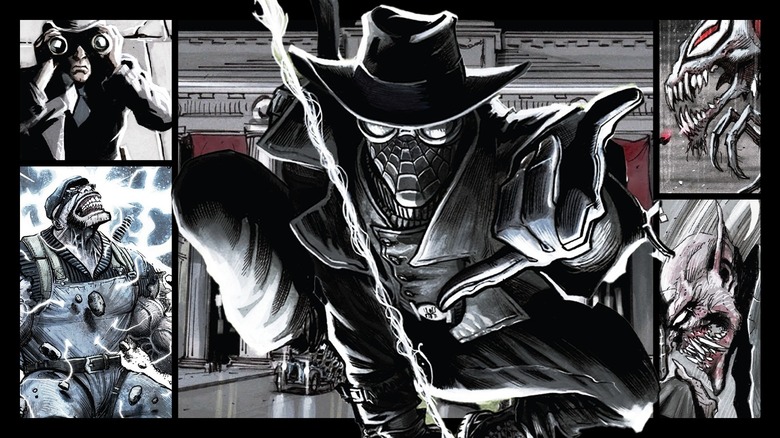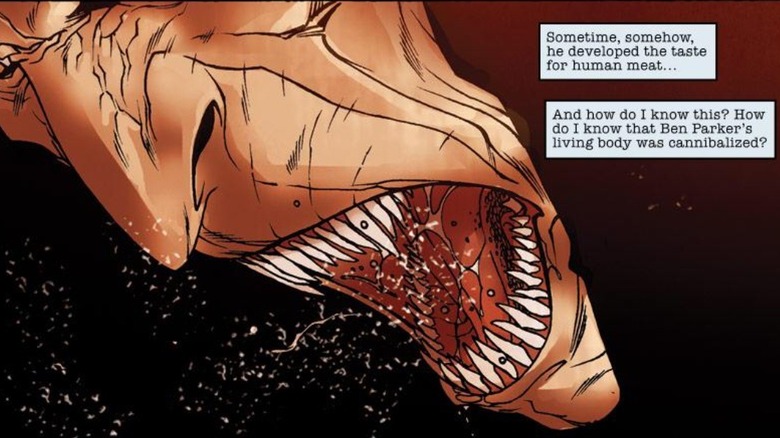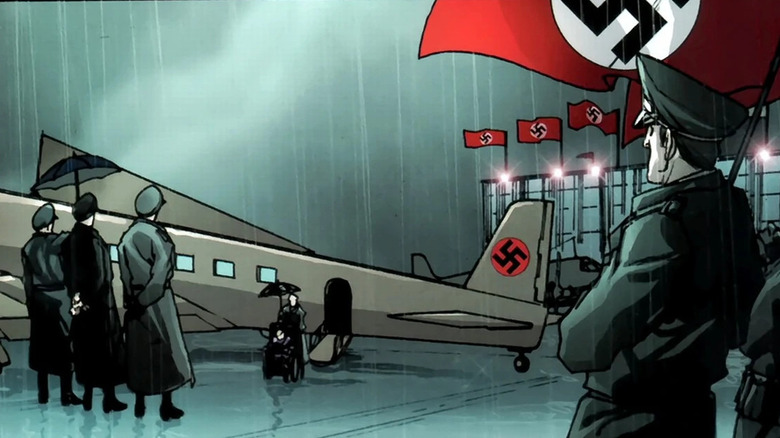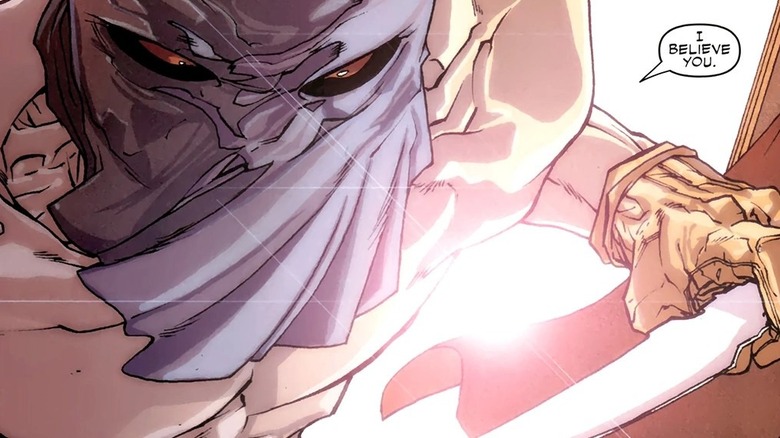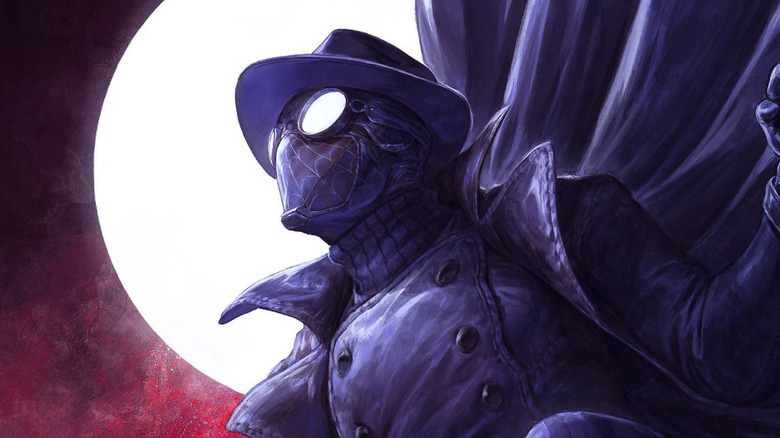Spider-Man: Noir's Live-Action Series Will Be The Web-Slinger's Darkest Outing Ever (If It Follows The Comics)
In the seedy underbelly of New York City, politicians and cops converge with gangsters and goons in speakeasies, spending their blood money on lapdances and nefarious activities. Criminals rule the streets and society's most powerful institutions, using intimidation, bribery, blackmail, and brutality to keep people in check. Meanwhile, kids starve on the streets, families live in caves, and good people get hurt. This is the world of "Spider-Man: Noir."
"Spider-Man: Noir" was conceived by writers David Hine and Fabrice Sapolsky in 2009. Taking place in Marvel's pulpy Earth-90214 universe, the story follows Peter Parker (and his vigilante arachnid alter ego) as he fights crime and fascism at the height of the Great Depression and into World War II. Along the way, we meet many familiar characters, albeit in ways we've never seen before.
Broadly speaking, the "Spider-Man: Noir" comics are gritty affairs that take cues from old-school pulp fiction stories. However, they're also disturbing horror tales that depict cruel experiments, cannibalism, and other atrocities. Some of the stories tap into the worst corners of real-life human history and argue that nothing has really changed. If Amazon's "Spider-Man: Noir" live-action series is anything like the comics, it's going to be dark — and here's why.
Vulture is hungry for human flesh
The Marvel Cinematic Universe version of Vulture is portrayed as a family man whose actions are understandable. He's a regular dude who transforms into a supervillain after losing his livelihood. Meanwhile, Michael Keaton's performance is more akin to a grumpy dad than a menacing sociopath. Still, while there's nothing wrong with a sympathetic villain, it's more entertaining when they're cannibalistic savages with a taste for the elderly.
In "Spider-Man: Noir," Vulture is a Nosferatu-esque figure who kills and eats Spidey's Uncle Ben like he's a plate of Ben's Original microwavable rice. Before he became the Green Goblin's right-hand man, he was a circus performer who lived in a cage and bit the heads off of chickens. The rest of his backstory is a mystery, but one thing is clear: he's ruthless.
It's already been confirmed that Peter Parker won't be the protagonist in the live-action "Spider-Man: Noir," so his uncle might be safe. That said, adding a cannibalistic Vulture to the mix is still a good idea, as there will be plenty of other people who can be added to his menu.
There are Nazis, too
"Spider-Man: Noir — Eyes Without a Face" contains a grim storyline about the Nazis and their inhumane medical experiments. Basically, Spider-Man must contend with the Friends of New Germany — a fascist organization that recruits Dr. Octavious to perform lobotomies on people of color and turn them into slaves. And the worst part? The United States government protects him because they find his research invaluable and he has dirt on America's own rulers.
Eventually, Spidey's beef with the Nazis takes him to Germany and beyond. For example, "Spider-Man: Noir — Twilight In Babylon" sees the fascists unearth an ancient evil and it's up to our arachnid adventurer to save the day. This story is fun and lighthearted compared to other tales in this universe, but the presence of Nazis still makes for some uncomfortable reading.
The Nazis of the "Spider-Man: Noir" universe are portrayed as vile monsters who envision a pure Arayan planet. Sure, some of the storylines are wacky, but they don't ignore the severity of the actual events that inspired them.
Crime Master is a violent misogynist
Crime Master is a nasty piece of work in the "Spider-Man: Noir" comics. He's a masked street-level thug with ties to the Nazis and the Ku Klux Klan, but his atrocities don't stop at his affiliations with racist groups.
In "Eyes Without a Face," Crime Master attacks his lover with a glass shard after he learns that Spider-Man paid her a visit. The sequence is cruel, disturbing, and predatorial; though it's certainly effective in establishing the character's viciousness and small pee-pee energy. The comics are full of harrowing moments, but this one is particularly gruesome as it deals with the topic of domestic violence and doesn't hold back.
No one respects Crime Master and it bothers him; he's desperate to be held in the same esteem as elite criminals like Green Goblin, but he doesn't have the skills. What he does have, though, is an enforcer in The Sandman, who's a hulking brute and rumored to have eaten the eyes of children in the past. That's arguably worse than Vulture feasting on Uncle Ben.
Spider-Man Noir has a cynical worldview
Noir has always been associated with real-world politics and social malaise. The genre rose to prominence after World War II and gained traction during the Cold War — a period when American politics was associated with anti-communist hysteria, class division, economic struggles, and general disillusionment. Noir gained new life in the 1970s thanks to films like "Chinatown," "The Conversation," and "All the President's Men," which reflected America's cynical cultural mood following the Vietnam conflict and Watergate scandal. The genre also experienced a brief revival in the 1990s — the decade that produced the Gulf War and a recession. In short, noir really shines during troubled times.
"Spider-Man: Noir" is more than a stylistic homage to the hard-boiled crime dramas of yesteryear. The comics embody the values of the political side of noir, and their messages aren't subtle. The system is corrupt; capitalism sucks; government officials and police officers are just as crooked as gangsters and deviants. Elsewhere, influential socialist protestors are targeted by assassins who work for the elites. The comics' worldview can be summed up by one particular Aunt May quote from the first issue: "Republicans. Democrats. The only thing they're debating is the most efficient way of turning your sweat and blood into a profit."
While the comics explore the sociopolitical concerns of Depression-era America, their anti-authoritative sentiments still carry some weight in 2023. If the TV series is serious about being a noir, there is no shortage of contemporary problems to comment on.
If you or someone you know is dealing with domestic abuse, you can call the National Domestic Violence Hotline at 1−800−799−7233. You can also find more information, resources, and support at their website.
